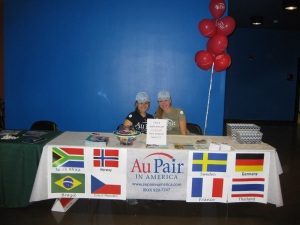
ABCs of a Successful Year
ALCOHOL – Explain laws regarding alcohol, i.e., underage drinking and drinking while driving. Generally, the drinking age in other countries is younger than it is in the United States.
APPLIANCES – Review directions for all your household appliances. Some, like garbage disposers, are not common in other countries. Offer the use of the washer and dryer right away, as many au pairs arrive with a limited wardrobe and have had no chance to do laundry at orientation.
BATHROOM – If the au pair is sharing a bathroom with family members, discuss scheduling, reasonable length of use, and housekeeping responsibilities.
CALENDAR – Explain the importance of entering classes, meetings, and social activities on the family calendar. Discuss what is acceptable notice for a calendar change.
CAR – If the au pair is allowed to drive, set guidelines on when and where. Explain seatbelt and car seat laws, what to do in an emergency, what to do in case of an accident, and who is responsible for the insurance deductible (and the amount) if there is a claim. Host families are responsible for providing transportation to and from classes and au pair meetings.
CONTRACT – Please abide by the host family contract. Do not ask the au pair to work more than 45 hours per week or more than 10 hours a day – even for compensation. All duties must be child care related. The one weekend off per month begins on Friday evening and ends on Monday morning.
CLASSES and CLUSTER MEETINGS – Au pairs are expected to attend cluster meetings and attend college classes. Ask the au pair to enter the date of her next meeting on the calendar and to check her class schedule with you before registering. Au pairs should not be scheduled to work at a time that would conflict with a meeting or a class
CURFEW – Most au pairs have not had a curfew at home. Allowing your au pair responsible freedom helps to build a relationship of trust.
DISASTERS – Review emergency procedures in case of fire or tornado and storm warnings.
EXERCISE – Encourage physical activity. Hanging around the house can lead to lethargy and depression, particularly during the winter. Membership at a Y or health club should be encouraged.
FOOD – Where in the house may food be taken? What are the house rules on meals and snacking
GUESTS – Set guidelines on entertaining guests, including overseas guests, in the home.
HOUSEWORK – What is the au pair expected to do? All housework should be child care related. Be specific about your expectations. Make sure she knows what to do in case of a cleaning “emergency” – child wets bed, dog gets sick, grape juice is spilled, etc.
INJURIES – Minor cuts and bruises are a standard part of childhood. Be sure the au pair knows where you keep your first aid supplies. Encourage her to take a Red Cross first aid class with an Au Pair in America scholarship.
JUNK FOOD – Be clear about what your children may and may not be fed. Indulging in junk food is not good for the au pair either
KITCHEN – Discuss expectations for keeping the kitchen neat and clean. Again, be specific about such things as wiping off the counters, cleaning up crumbs from under the table, etc
LAUNDRY – Give detailed instructions about sorting, emptying the lint trap, etc
MEDICAL RELEASE – Make sure that the children’s doctors know that you have an au pair. Have a medical release on hand in case of an emergency.
MONEY – Set a weekly payday. Help her open a bank account.
NEIGHBORS – Give your au pair a summary of the neighborhood, including introductions to the nearest neighbors and where to go for help or a spare key.
ORIENTATION – Allow three days to settle in before leaving your au pair alone with the children. Use the first week to orient your au pair to her new city. Show her around as you would any newcomer or guest. Point out places that she will want to visit, such as cinemas, shopping areas and especially the post office.
PRIVACY – It is important not only that the au pair and host parents honor each other’s privacy, but also that the children are taught never to enter the au pair’s room without permission.
QUESTIONS – Give her the opportunity to ask questions. Sometimes au pairs are reticent about approaching host parents. Arrange several times in the first few weeks to meet with your au pair without the kids around. A weekly meeting throughout the year can be very beneficial to the host family-au pair relationship.
RECREATION – Keep in mind that both the au pair and the kids need to have fun. Leave time in the daily schedule for play.
SAFETY – Discuss safety procedures for the children and childproofing devices. Explain 911. Be clear about your rules regarding locking windows and doors, car doors, and opening the door to strangers.
SCHEDULE – Inform your au pair of the weekly schedule in advance so she can make plans for her free time. Scheduling day to day leads to uncertainty and frustration.
SCHOOL – Make sure your children’s schools know the name of your au pair and whether they may release your child to the au pair in case of sickness or an emergency.
TELEPHONE – What are the rules on telephone use during work-time? What about long distance? Check with your long distance service about the most economical way of calling overseas, and then explain the details to your au pair. Or you may prefer that she use a pre-paid phone card. Explain call waiting, voice mail, and answering machines.
TELEVISION – Set limits on how much and what may be watched. (This includes watching MTV while children are present.
THANKS – Everyone needs to feel appreciated. Please notice and comment on the good job your au pair is doing. You may think it is just part of her job, but the au pair will need it to be noticed
UNDERSTANDING – Understand that the au pair may be dealing with both a language and culture barrier at first. Be patient!
VACATION – Discuss the best times for the au pair to take her two weeks of paid vacation. The final decision must be agreed upon mutually.
WINDOWS – Discuss opening windows with the au pair – air conditioning is not as common in Europe.
X-RATED – Attitudes regarding sex might be different in the au pair’s country. The au pair may, on the other hand, be shocked at the violence in our media. Set guidelines regarding your children’s entertainment.
YOUTH – Remember that your au pair is a young adult. She is still growing and learning just as we all did at that age. She will make mistakes. Please treat her as you would want your own child to be treated.
ZZZZZs – Remind the au pair of the importance of getting enough sleep. Kids move fast. Au pairs must be alert!







